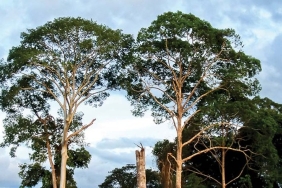FINDING SOLUTIONS AMIDST INDONESIA'S FOREST FIRES
By: Ary Pamungkas
As one of the countries with a large forest area, Indonesia has an important role as the lungs of the world. Moreover, Indonesia has 10% of the world's remaining tropical forests. In addition, Indonesian forests are home to 12% of the total number of mammal species, 16% of reptile and amphibian species, 1,519 bird species, and 25% of fish species in the world. Some of them are endemic, or can only be found in the area.
However, Indonesia's forests have recently faced complicated problems. In addition to massive deforestation/forest logging, forest fires that occur almost every year are also a problem that is quite difficult to overcome.
Currently, forest fires have also become an international concern as an environmental and economic issue. They are considered a potential threat to sustainable development because of their direct impact on ecosystems, contribution to carbon emissions, and biodiversity.
In late 1997 and early 1998, as well as 2006, the world was able to witness the sad and horrific incidents when fires ravaged millions of hectares of tropical forests in Indonesia. These devastating events left long trails across the islands of Sumatra and Kalimantan, in the form of thick blankets of smoke that seriously endangered human health. The fires also jeopardized the safety of air travel and caused huge economic losses across the region. There were also many complaints from neighboring countries.
According to Forest Fire Coordinator,Forest-Freshwater-and Terrestrial Species Program, WWF-Indonesia, Dedi Hariri, the main cause of forest and land fires is none other than the human factor through several activities, including land clearing and conversion for cultivation and plantations. ""Usually these activities (land clearing and conversion) are carried out by the community and companies by burning. Even today, the practice of burning land is carried out uncontrollably, so that land fires occur massively," explained Dedi.
"Apart from human activities, seasonal and weather conditions are indirect causes, or merely supporting factors. Climate and weather only condition the possibility of forest and land fires, while the arrival of the dry season is utilized by certain parties to clear and burn land," Dedi added.
Dedi said that forest fires cause a number of negative effects, ecologically, economically and politically. "For the general public, the most pronounced and dominant effect is the smoke nuisance, as it has a direct impact on daily activities," he said.
"For now, forest fires are still happening. Based on hotspot data from NOAA-18 until the end of September 2012, hotspots are still visible in several provinces, namely West Kalimantan (6,280 spots), South Sumatra (5,714), Riau (4,600), Central Kalimantan (3,205), and Jambi (2,311)," Dedi added.
Dedi further explained the need for serious handling of the current forest fire problem. Basically, all parties must be responsible. "The government and the community must prioritize the prevention aspect, because it will be more effective in overcoming forest and land fires."
In WWF Indonesia's long journey in preserving forests in Indonesia, WWF Indonesia also participates in seeking solutions to the problem of forest fires in Indonesia. In the past few years, there have been many physical activities in the field to reduce fires, including monitoring hotspots and mapping the distribution of hotspots according to land use, mapping company concessions that have indicated hotspots in their areas, and organizing judicial workshops for law enforcement of forest and land fire cases.
"Currently, WWF is also conducting a number of activities to anticipate forest fires, namely facilitating communities in increasing the capacity of forest and land fire control, socialization of zero burning, and increasing awareness of the dangers of fire. Not only that, WWF Indonesia is also socializing and promoting zero burning and fire management systems to the private sector, facilitating between government agencies in the regions to synergize efforts to control forest and land fires, and encouraging local governments to issue local regulations governing forest and land fire control," said Dedi.
About WWF Indonesia
WWF is an independent, global conservation organization founded in 1961 in Switzerland, with nearly 5 million supporters and networks in more than 100 countries. In Indonesia, WWF has been present since 1962 for the one-horned rhino program in Ujung Kulon, became a foundation in 1998, and is active in more than 25 working areas in 17 provinces. WWF-Indonesia's mission is to save biodiversity and reduce the ecological impact of human activities through: Promoting a strong conservation ethic, awareness and conservation efforts among Indonesians; Facilitating multi-stakeholder efforts for the protection of biodiversity and ecological processes at the ecoregion scale; Advocating for policies, laws and law enforcement that support conservation, and; Promoting conservation for human well-being, through the sustainable use of natural resources. For more information, click www.wwf.or.id or www.panda.org





